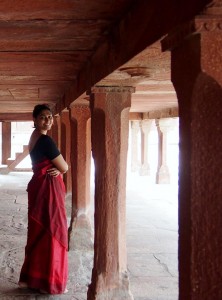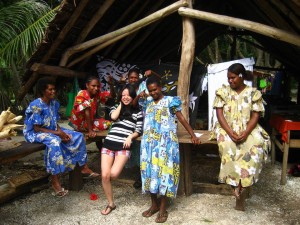short shorts and long burqas
There are two reasons why it was easy for me to travel and explore new cities. First, I lived in Kuala Lumpur for most of my life until I moved to Melbourne. Kuala Lumpur is a 2 hour flight to most South East Asian cities, food havens and tropical islands. Second, budget airlines expanded in the region the same time I started working, so travelling was both logistically feasible and affordable.
In the last 15 years, I’ve been a backpacker, a flashpacker, and a business traveller. Irrespective of where and why I travel, I realised that I have to do one extra bit of research compared to my male companions: I have to look up the local written and unwritten dress codes to make sure that I am appropriately dressed for the local customs, the weather and for what I plan to do.
Many people assume that this is common sense and to some extent, it is. But there are all sorts of little details that go unnoticed. For example, if you visit a temple in Bali, you can have bare shoulders but have to cover your legs. In India, baring your midriff is fine, because that’s how sarees are designed, but baring your shoulders or thighs is not. In Vietnam, you can wear shorts but it will be very obvious that you’re a tourist because the locals cover up every inch of their body to avoid getting tanned!
I started asking friends about their experience and it became clear to me that so many women have interesting anecdotes about their own travels and were looking for a platform to share it. And it is not just about ditching your shorts and being conservatively dressed when you travel, because on the other end of the spectrum women who wear hijabs and burqa get some unwanted attention when they travel to other parts of the world. That motivated me to start a FB page to document these stories, called Short Shorts and Long Burqa.
As a start, I want it to be a platform for people to share their experience when they travel to a new destination. If there is enough volume and interest, perhaps it can be a general education page about dress codes for a city, but I recognise that a lot of this is personal interpretation because two people can be dressed the same way in a city and still have different stories about how the locals reacted to them.
As I collate these stories, I realise dress codes can be very arbitrary and that being respectful of others while being comfortable in your own skin is a fine balance. Many women who reach out to me talk about the heat as a major discomfort, which is understandable because as a traveller, you’re not used to the local weather. My favourite story is from a woman who chooses to wear a sundress or shorts in most countries including Malaysia, Sri Lanka and Indonesia because it is easier to give herself her insulin jabs. She claims that she has never attracted unwanted attention although some of the locals in these countries are more conservatively dressed and puts it down to divine intervention.
Going to a place of worship is tricky as well but I find a scarf is a great asset to bring along as you can wear it as a wrap about your legs. Most temples and mosques provide sarongs anyway. I was pleasantly surprised when I went to a mosque in Turkey in my shorts and the caretakers just handed me a sarong to wear when I went inside. It was all easy and fuss free.
Personally, I am not keen to go to a country where I cannot wear shorts in public because I practically live in my shorts, even in the cold Melbourne weather. That is me at my most comfortable and I want to be comfortable when I travel. I assume that my stubbornness means that I will likely never go to parts of India or many countries in the Middle East but this is something I am willing to live with. However, a contributor told me that it is perfectly acceptable to wear shorts in Abu Dhabi, so through this project, my own assumptions about regions, countries and cities are challenged and I love that.
The project is still at its infancy and I am keen to collate a range of stories from women who travel. Do email a few lines of your experience and send it to [email protected]
*Annie Hariharan is a business consultant, pop culture nerd and occasional writer. She is interested in people, places and cultural identities and is constantly searching for better ways to narrate these stories though articles and community projects*



